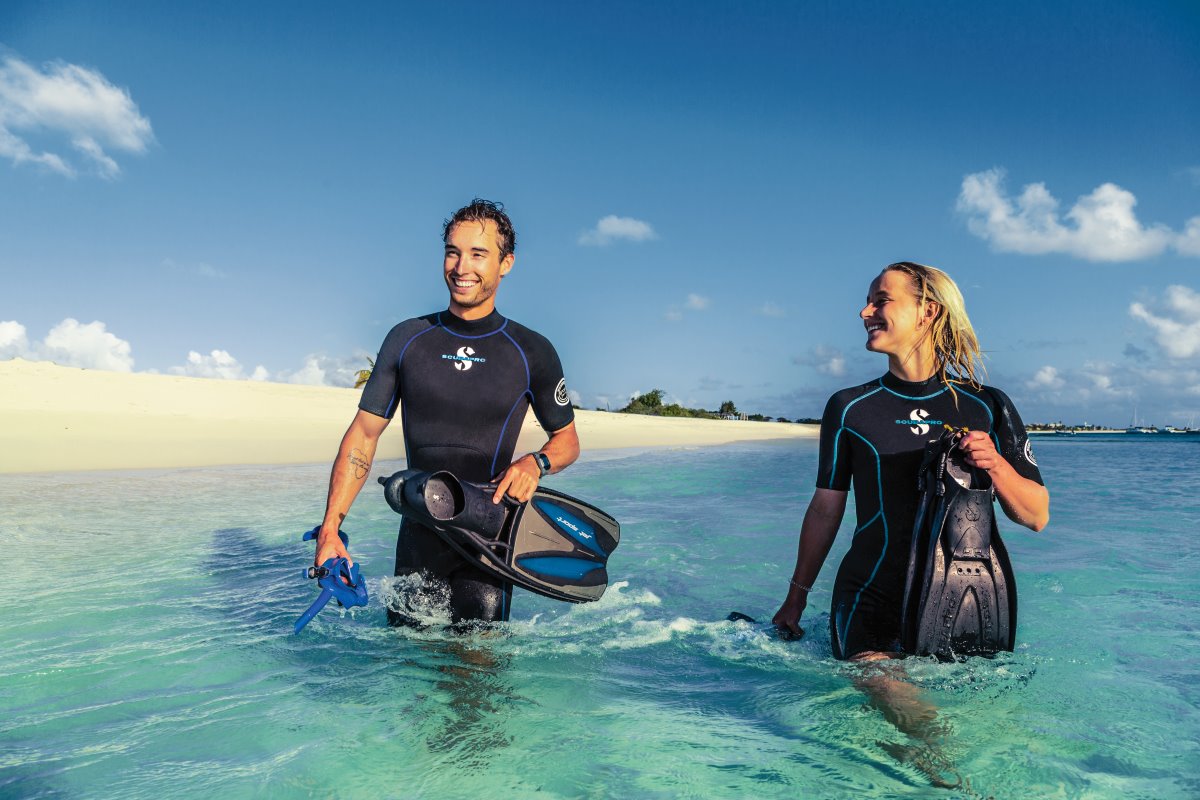
Take a moment and imagine yourself floating weightlessly in a turquoise abyss, surrounded by a kaleidoscope of coral reefs and curious fish. The only sound is the rhythmic whoosh of your own breath, a soothing melody that washes away stress and worry. As you glide through this underwater paradise, you feel a profound sense of peace and tranquility. This isn't just a scene from a movie – it's the transformative power of scuba diving.
While we often talk about the physical benefits of diving – increased fitness, improved cardiovascular health, and enhanced flexibility – we sometimes overlook the profound impact it can have on our mental well-being. Scuba diving isn't just a sport; it's an immersive experience that offers a unique blend of relaxation, mindfulness, and personal growth.
So, let's take a deep breath and explore the surprising mental health benefits of scuba diving. Get ready to discover how this underwater adventure can transform your mind, body, and spirit.
The Healing Power of the Underwater World
Have you ever noticed how being near water – whether it's the ocean, a lake, or even a pool – instantly calms your mind and soothes your soul? There's a scientific reason for that. Marine biologist Wallace J. Nichols coined the term "blue mind" to describe the meditative state we experience when we're in or near water.
The underwater world offers a unique sensory experience that can have a profound impact on our mental health. The gentle pressure of the water, the rhythmic sound of our breath, and the mesmerizing dance of marine life all combine to create a sense of tranquility and peace.
Scuba diving also allows us to disconnect from the constant distractions of our daily lives. Underwater, there are no ringing phones, no buzzing notifications, no deadlines looming over our heads. It's just you, your breath, and the vastness of the ocean. This sensory deprivation can be incredibly therapeutic, allowing us to truly relax and recharge.
And let's not forget the feeling of weightlessness. Freed from the constraints of gravity, we can move effortlessly through the water, exploring a world that feels both familiar and otherworldly. This sense of freedom can be incredibly liberating, helping to release physical and mental tension.
A 2017 study in Frontiers in Psychology found “Scuba diving allows individuals to connect with the natural world on a deeper level. This connection has been shown to have positive effects on mental well-being, reducing stress and promoting relaxation."
Scuba Diving as a Form of Mindfulness
Mindfulness is the practice of paying attention to the present moment without judgment. It's about being fully engaged in whatever you're doing, whether it's eating a meal, walking in the park, or, in this case, scuba diving.
Scuba diving is inherently mindful. It requires your full attention to your breathing, your surroundings, and your body's movements. As you navigate the underwater world, you're constantly scanning for potential hazards, monitoring your air supply, and adjusting your buoyancy. This focused attention can induce a flow state – a state of complete absorption in the activity where you lose track of time and feel a sense of effortless joy.
The deep breathing techniques used in scuba diving are also similar to those practiced in meditation and yoga. Slow, deep breaths activate the parasympathetic nervous system, which promotes relaxation and reduces stress. This is why many divers describe scuba diving as a form of underwater meditation.
Research supports this idea, as a study published in The Journal of Integrative and Complementary Medicine found that "the act of diving requires focus and concentration on the present moment, fostering a state of mindfulness and relaxation. This can help individuals manage stress, anxiety, and even symptoms of depression."
Building Confidence and Overcoming Challenges
Scuba diving isn't always easy. It requires learning and mastering a variety of skills, from basic techniques like clearing your mask and equalizing your ears to more advanced skills like navigation and buoyancy control.
But overcoming these challenges can be incredibly rewarding. The sense of accomplishment you feel after completing a successful dive can boost your confidence and self-esteem in ways you never imagined.
As one study published in Diving and Hyperbaric Medicine states, "Overcoming challenges and mastering new skills underwater can boost confidence and self-esteem. The sense of accomplishment from completing a successful dive can translate into other areas of life."
This sense of empowerment can extend beyond the dive site. The confidence and resilience you develop underwater can help you tackle challenges in your everyday life with renewed vigor.
The Social Side of Scuba: Diving into Community and Connection
Scuba diving is more than just an individual sport – it's a social activity that can foster deep connections and friendships. The dive buddy system, a fundamental principle of scuba diving, relies on trust, teamwork, and communication.
Group dives and social events, such as dive club outings or liveaboard trips, offer opportunities to meet like-minded people who share your passion for the underwater world. These shared experiences create a sense of camaraderie and belonging, which can be especially beneficial for individuals who may feel isolated or lonely.
A study published in The American Journal of Psychiatry supports this, stating that "Scuba diving is often a social activity, providing opportunities for interaction and bonding with others. This social support can be beneficial for mental health, particularly for individuals who may feel isolated or lonely."
Scuba Therapy: Diving for Healing and Recovery
Scuba diving is not only a fun and adventurous activity but is also increasingly recognized as a therapeutic tool for individuals with various physical and mental health conditions.
A 2016 study published in the Journal of Disability and Rehabilitation focused on the impact of scuba diving on military veterans with post-traumatic stress disorder (PTSD) and physical injuries. The results were remarkable: participants reported significant improvements in levels of anxiety, depression, and social functioning, as well as a reduction in insomnia.
These findings suggest that scuba diving can play a valuable role in helping individuals cope with trauma and improve their overall well-being. The unique combination of physical activity, mindfulness, and social connection offered by scuba diving creates a powerful therapeutic environment that can promote healing and recovery.
Dive into a Healthier You
The mental health benefits of scuba diving are as vast and diverse as the underwater world itself. From reducing stress and anxiety to fostering mindfulness and boosting confidence, scuba diving offers a unique and powerful way to enhance your overall well-being.
So, if you're looking for a way to improve your mental health, consider taking the plunge and exploring the underwater world. Who knows, you might just discover a newfound sense of peace, joy, and connection to the natural world. And if you're ever in the Chicagoland area, be sure to stop by Dive Right In Scuba – we'd love to chat with you about all things diving!
